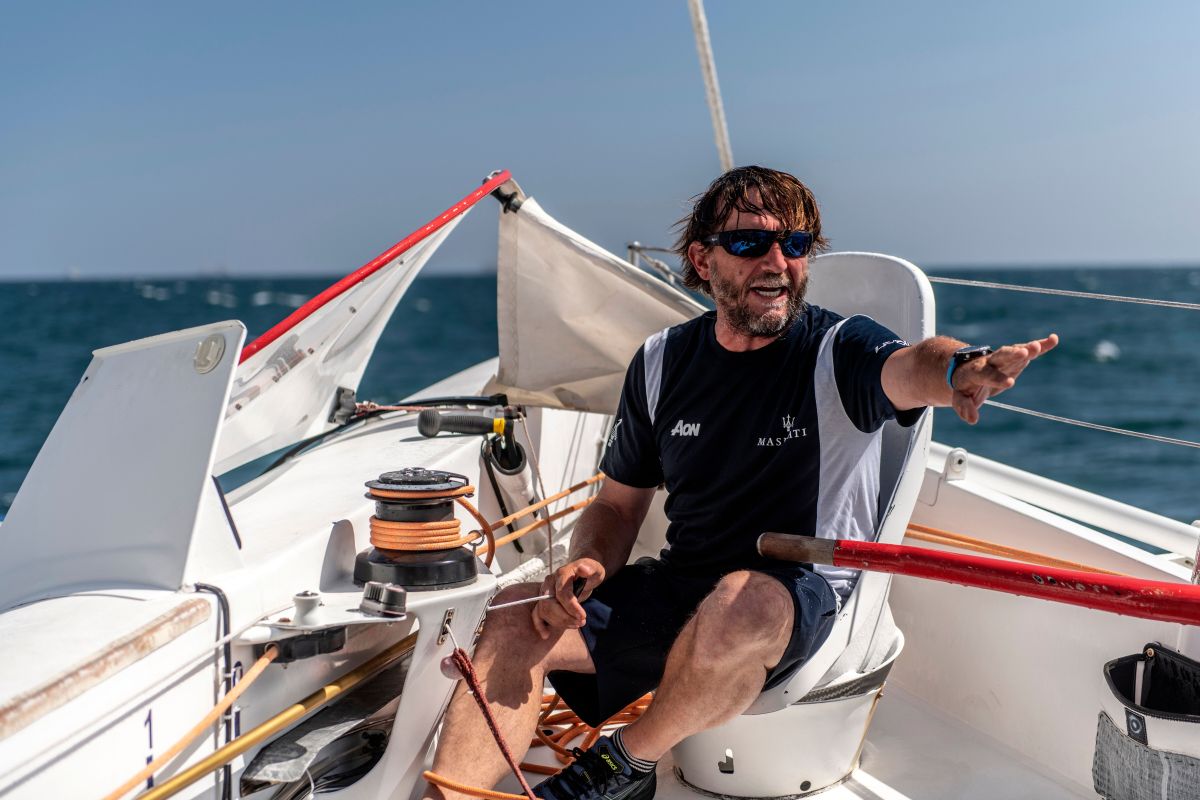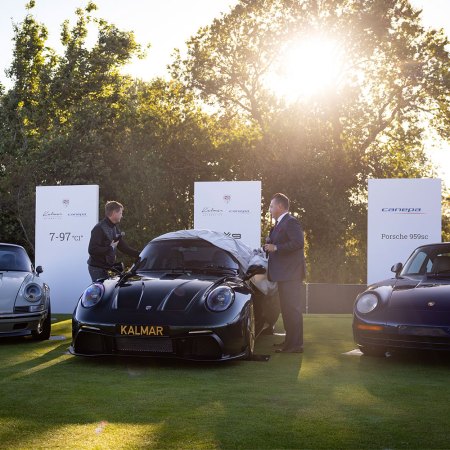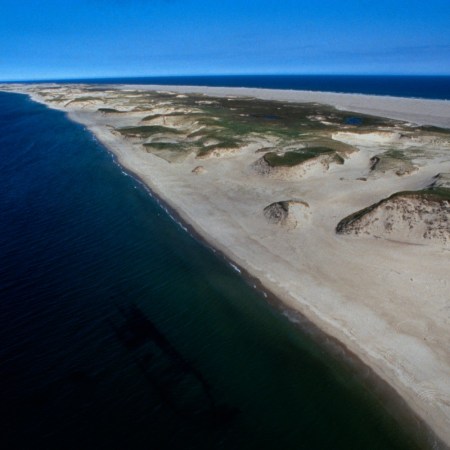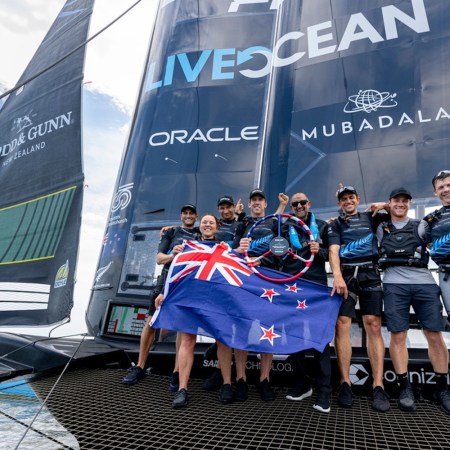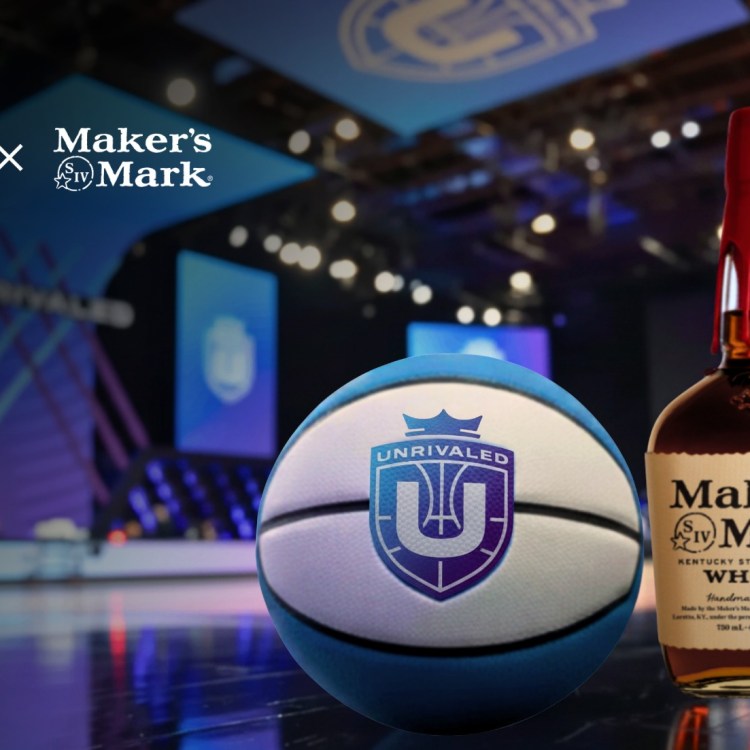“And now, we are actually flying!” yells Captain Giovanni Soldini, sitting at the helm of the Maserati Multi70 trimaran, as we soar over the Pacific Ocean’s whitecaps off the coast of Long Beach, California. We are basically on a joyride aboard the multi-million dollar experimental offshore foiling race boat designed and built for a small team of bright-minded pirates in pursuit of smashing world records. I am nearly blinded by the salty spray while crew members — Niko, Carlos and Oliver — scramble about the boat, ducking the boom to pull on lines, crank winches, and climb the mast to raise and secure its lofty sails. At 35 knots aboard the built-for-speed watercraft — tilting ever-too-close toward the water line — our afternoon excursion feels very dangerous with little margin for error. At best, a mistake out here could become a miserable hypothermic swim back to the shore. Worst case — shark bait.
I peer through the salty spray at the captain for some sense of security, some sign that he’s got us covered and I’ll return home safely to my family and a hot meal. Soldini is grinning ear-to-ear, literally beaming with joy. The crow’s feet etched into the corners of his eyes, a silver hoop dangling from his left earlobe, a tattoo of a sperm whale on his right forearm — this is a man of the sea, a true pirate, a seafaring nomad, a thoroughbred sea dog who has mastered his craft and maintains an insatiable thirst for more. And what I find even more fascinating about Captain Soldini is that he can intelligently speak on the physics of sailing just as easily as he could probably send an unwanted passenger down to Davy Jones’ Locker. “Typically the hydrofoil and the airfoil travel through the boundary layer at the hull, where there is a lot of drag. Our Multi70 avoids much of the drag by rising above the boundary layer and the boat is no longer in displacement mode. It is really flying,” Soldini explains.
Considered by many to be the most famous Italian navigator of our century, Soldini was raised in landlocked Milan, Italy. After spotting his first boat, he fell instantly in love with the idea of life at sea. “I love to voyage,” says Soldini. “And a sailboat is a less expensive way to go anywhere in the world. But what you pay with—is time. That is the true currency of a sailor.” By age 17, Soldini had sailed across the Atlantic for the first time and pledged the rest of his life to sailing the seven seas and taking on regatta challenges.
Last year, Soldini and his eight crewmembers shattered the “Tea Route” record by sailing the 13,000-nauticle mile span from Hong Kong to London in 36 days (defeating a decade-standing record by five days and 19 hours). Similarly, he recently beat the “Golden Route” record — a 47-day journey that covered 13,225 miles from New York, rounding Cape Horn, and ending in San Francisco; just as the old clipper ships did during the California Gold Rush.
“I love all sailing and regatta, but I also really love the history of the old trade routes,” says Soldini. “So these records that are really important to me are probably the Tea Route, the Golden Route, which I did with my team; and then two Around Alone races — just me circling the world alone.” The latter took Soldini just over 116 days to cover the course of 26,000 miles around the globe (shaving nearly 5 days off the previous record time).
Throughout myriad oceanic expeditions, Soldini has come to gain a special understanding of our planet and its intricacies with rare perspective. “In a boat, you have all the same problems of the world, but very concentrated,” says Soldini. “And when you are out crossing an ocean, you must also find solutions very quickly or you will quickly have more problems. You can use experiences like this and apply them to life in the whole world.” Over three decades focused on the open sea, Soldini has seen clean oceans turn into massive garbage gyres, honed his skills on conservation of food and energy, and learned to live with what few personal items a light-weight racing boat can accommodate.
After our precarious jaunt at sea, InsideHook sat down with captain Soldini to hear more about the many lessons he’s brought back with him from a life spent mostly on boats. Here are six life lessons from the seafaring sage that could help reduce global pollution and consumption, make better use of renewable resources, and reduce our impact on the planet and it’s oceans.
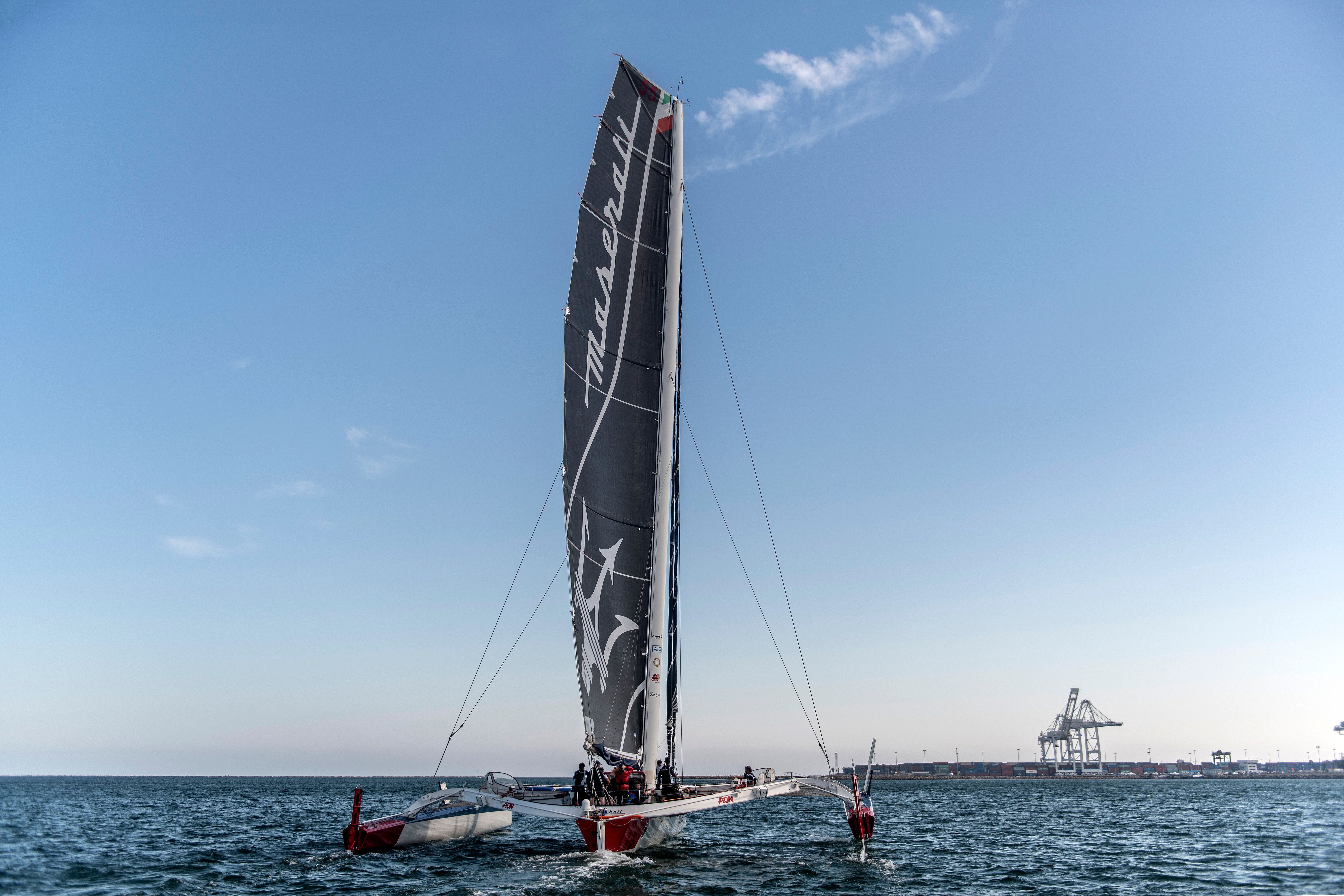
Zen and the Art of Watercraft
“We hit a lot of stuff in the water, a lot of garbage. That is a little bit of our problem — when the boat is flying, it’s catching everything. If you have a traditional boat with a hull in the water, naturally the boat will push the debris away from the boat—it will displace. But with our boat, with only a foil in the water, it doesn’t move anything. So if something is coming, we will hit it. This has destroyed our foil, which takes three months to make (A new foil is made up of approximately 120 layers of carbon fiber. Then it is processed through a sophisticated CNC machine and then milled and shaped to perfection). So, we designed a new one that would break away on impact and we can save and repair the piece to save time. The important message here is to always be keen for ways to improve the way things work— whether in your home, at your job, or on your boat.”
Eating and Burning Clean
“We cook onboard the Maserati with a pressure cooker. So we make pasta, rice, legumes, and lentils — energy food. A pressure cooker is actually very good because it allows you to use much less water and much less energy to heat — so it’s a good solution to reduce consumption of resources and energy. You also need to have a very good diet when sailing because you burn a lot of physical energy, especially when it’s very cold. Otherwise, when you arrive, you could be very skinny — sometimes this is a good thing [laughs].”
Protecting Our Oceans
“Sailing on our boat is very dangerous because there is a lot of stuff floating in the ocean. This is very dangerous on the Transpacific Yacht Race because of the garbage circle with a large concentration of plastic just floating with no place to go (The Great Pacific garbage patch is the largest accumulation of ocean plastic in the world and located between California and Hawaii). There are no clean oceans anymore. Sure, maybe twenty or thirty years ago. But today, all the oceans have problems. That’s an experience that puts you in direct perspective of these things and gives you a special point of view. We now need systems to repair the damage we have done and also to prevent these kinds of pollution in the future. It cannot continue the way it has before.”
Energy Production and Consumption
“When you want to sail far across an ocean you must be light. You cannot bring a lot of water and you cannot bring a lot of energy; which in our case is diesel fuel — both add too much weight to the boat. So we study a lot on how to save energy and how to produce energy. Our Maserati Multi70 is full of solar panels. When we set out to break the record from Hong Kong to London (13,000 miles of the Tea Route), the weight of the diesel fuel would be absolutely too much—and only to charge the batteries. And so, we look for solutions for these kinds of problems. Solar panels are a good solution and we have many on the boat. There are also hydro and wind generators — many solutions that provide renewable energy.
It is also very important to pay attention to consumption. Careful all the way down to what kind of lamps you use at night, what kind of computers, and stuff like that. It’s the same that we should consider in the real world, only in the middle of the ocean on our little boat; we realize these impacts much more quickly. It’s simple: if we want to take care of our planet, we need to be more mindful of what and how we consume, preferably to consume less. And we need to focus on producing clean energy. “
Live Heavy, Travel Light
“Let’s say that I love to travel light, even on the land. We don’t really need too many things. You realize this while on the sea and the philosophy carries onto the land.
You don’t need much in life; you see this under a microscope on a boat. With the Multi70, the problem is that our boat is only 6,000 kilograms. So every additional kilo counts and we have to be very careful with that. We normally try to have a very small baggage with few personal belongings and only the minimum necessary to eat. On the boat, as in life, it is advantageous to have as little as possible to slow you down.
And rubbish is a big problem. After 20 days of navigation with a crew of eight people, you can create a lot of rubbish if you are not careful about what you bring on the boat with you. You have to make intelligent choices that will have a smaller impact on everything. It’s a perfect micro-situation that explains the need to produce less waste. On the boat we are obligated to find a solution very quickly. This can apply to the rest of the world in the same way.”
Always Be Present in the Moment
“I did two solo races around the world, but they were races, so I was very concentrated on beating the others — focused, diligent, intense; but you also think a lot too because you are in a special condition and you are alone at sea for a long time. Even if the boat is fantastic and very fast, the velocity is still quite slow compared to an airplane. It can take many days to get from one place to the next, so you have more time to think about your life and how we interact with the planet.
But you also have more time to prepare to arrive in each new place. It is not always good to arrive somewhere very quickly — take the time to think about it and be in the moment and enjoy. For me, the biggest reward of sailing in a regatta, whether it’s by myself or with a team, is simply arriving. Because when you arrive, you are already victorious. You surely fought some kind of battle and succeeded.”
The Charge will help you move better, think clearer and stay in the game longer. Subscribe to our wellness newsletter today.
